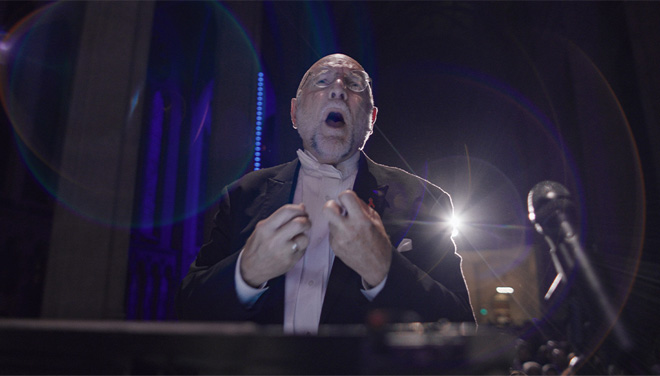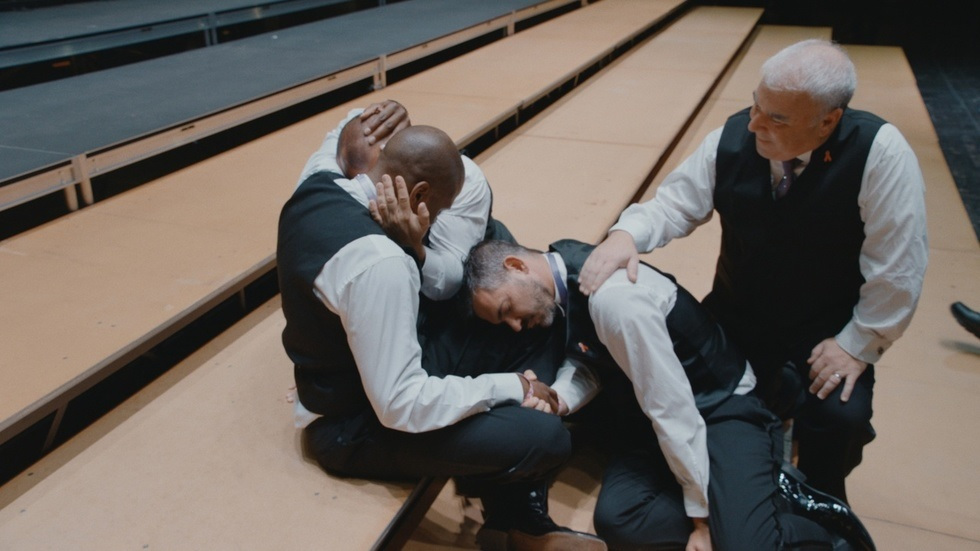by Nathaniel R
 Nathaniel and two fellow jurors (though we weren't in the same jury) at AGLIFF
Nathaniel and two fellow jurors (though we weren't in the same jury) at AGLIFF
Hello "y'all" (when in Texas...) writing to you from blistering hot Austin where the 32nd annual aGLIFF festival is nearing its wrap. The festival, which runs from Thursday to Sunday each year in late August is actually the oldest film festival in Texas. Yes, even older than SXSW though not as famous.
The festiviites began Thursday night with a packed house at the Alamo Drafthouse for a performance by the Austin Gay Men's Chorus followed by the opening night film, Gay Chorus Deep South (2019). It's a very moving documentary about a the iconic San Francisco Gay Men's Chorus and an all volunteer charity tour they made of the Deep South after T****'s election. The tour was an attempt to bridge divides between red and blue, and combat rising anti-LGBT sentiment within the country and specificially the ever-present anti-LGBT sentiment within our nation's churches...

 Gay Chorus Deep South
Gay Chorus Deep South
For anyone who ever grew up in a religious environment (*raises own hand*) Gay Chorus Deep South triggers lots of feelings. And that's on top of the natural emotional pull of gorgeous choral music. The individual stories we look at within the men's chorus were all interesting and like many of the best documentaries, it's confident enough to throw in voices of dissent or aggressive tones that don't always toe the line with the overall message. One particularly surprising moment involves a gay historian who looks down at the tour as rather patronizing to the South. Another strong scene features the director of the choir unwilling to meet a religious man in the middle who is offering "tolerance" -- that's not enough for the director who has had it with the implications of that word.
But in the end the message is an inspiring and hopeful one, celebrating the power of collective desires for understanding, peace and live-and-let live unity.
 Since Thursday night there have been a number of good films and very enjoyable parties (that's me hanging with some famous and rising lesbian directors at a brunch pool party to the left. I'm the one with the blindingly white skin; I apologize for any retinal damage I may have caused). There has also been lots and lots of southern fried food so I write to you surely 10 lbs heavier in a single weekend.
Since Thursday night there have been a number of good films and very enjoyable parties (that's me hanging with some famous and rising lesbian directors at a brunch pool party to the left. I'm the one with the blindingly white skin; I apologize for any retinal damage I may have caused). There has also been lots and lots of southern fried food so I write to you surely 10 lbs heavier in a single weekend.
Last night before a screening of Becoming Leslie (a documentary profile of a local cross-dressing Austin celebrity) we were honored to be part of the awards ceremony (Click here for a happy 2 second video glimpse of the entire jury - I give you a wee wave at the end).
The winning narrative features were both Asian films. The top prize went to the Chinese movie A Dog Barking at the Moon, which is about a family's discovery of their father's homosexuality. But the narrative jury also gave a special mention to the Vietnamese drama Song Lang concerning an unlikely relationship between a debt collector and an opera performer.
I was on the documentary jury. We all liked the doc Seahorse about a trans man who goes off hormones to carry a child to fulfill his desire of becoming a father. We also had lively discussions about The Archivettes (the story of the Lesbian Herstory Archives in New York City) and Dykes Camera Action (about the history of lesbian filmmaking). But in the end we unanimously agreed that Changing the Game, an elegant take on the controversy surrounding trans athletes in high school sports, was the best of the seven competing films we screened.
 Mack Beggs in "Changing the Game"
Mack Beggs in "Changing the Game"
As we learn in the film, the politics around trans athletes are complicated as each state has their own laws surrounding the issue. In Texas for example, trans high school students are only allowed to compete with the gender assigned to them at birth. Mack, the film's most dynamic subject, was born with female genitalia but started to transition as a teenager. He only wants to wrestle on the boys team. Since Texas refused to honor his wishes, he wrestled girls. It caused a lot of controversy in red Texas where he was targeted by transphobic media since Mack was on testosterone which many less sympathetic types argue gave him an inappropriate advantage. He won two state championships before college and ends his senior year with a 36-0 record. Over in Connecticut, where the laws are different, we meet a trans female athlete competing in track and field on her chosen team, the girls team. Like Mack she's also a champion and like Mack she's also under fire because of perceived advantages, though in her case it's for the opposite reason since she is allowed to compete on the team she identifies with.
The film was compelling from the jump, and avoids the pitfalls of many multi-subject docs, with smart editing and cinematic style; the jumps between the stories were never jarring. It's a very well made doc but the moment I knew I loved it rather than just admired it came near the end [SPOILER] when it takes a surprising short detour into the ambitious of a cis female wrestler who is training hard to beat Mack, the reigning state champion. Unlike some of the transphobic adults we hear from, she admires Mack and bears him no malice whatsoever but her story and desire to win is also compelling so it's hard to not feel for her when she loses. This nod to the human complexity of the situation and willingness to complicate the story of Mack's own success is beautiful. Afterwards we see Mack briefly competing with men (as was always his wish) in college. He's got a huge smile on his face whether he's winning or losing. While I've never been into sports, it's hard not to root for a sports doc which tells its stories with such sensitivity while embodying good sportmanship. Changing the Game is eager to play but wins or loses with both passion and class.